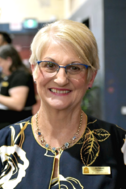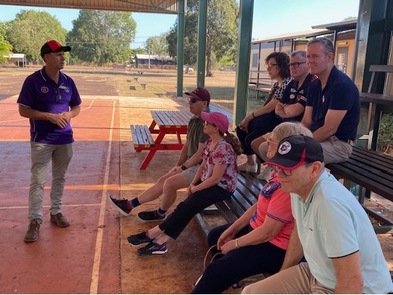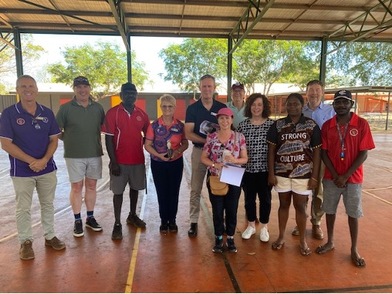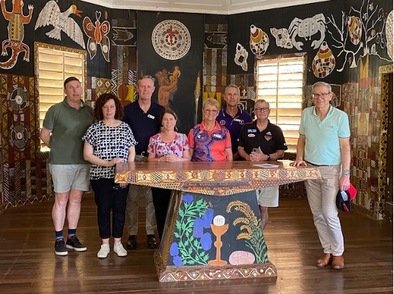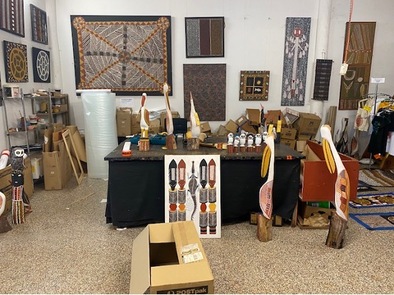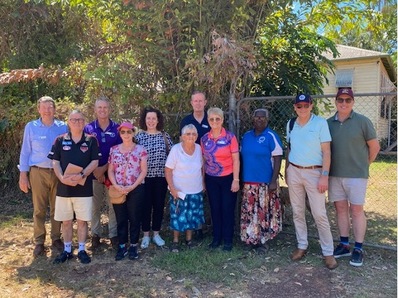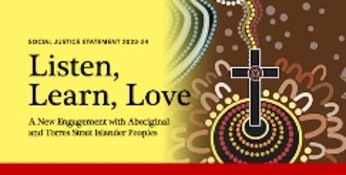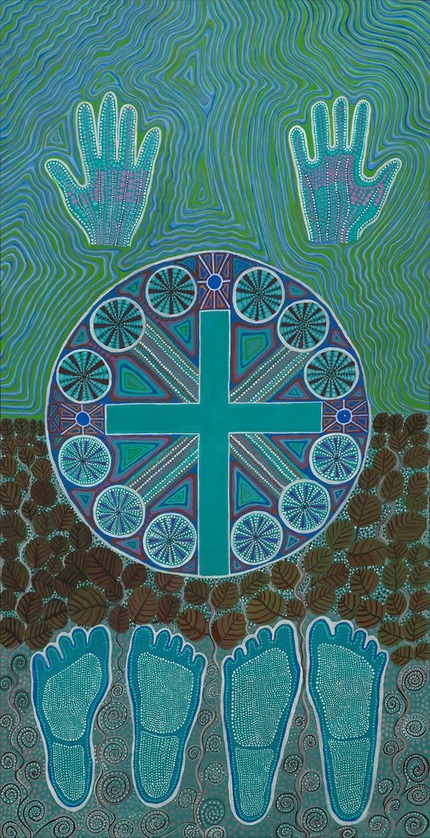September 2023 Newsletter
-
President's Message
-
CaSPA Latest News
-
CaSPA Board Update
-
NGS Super - Platinum Partner
-
Latest Research from Australian Education Research Organisation (AERO)
-
Box Of Books - Platinum Partner
-
A New Engagement
-
PSW - Platinum Partner
-
Australian Judges Statement – Voice to Parliament
-
The School Photographer - Platinum Partner
-
NCEC Response to National School Reform Agreement
-
AGH Camps - Gold Partner
-
ACPConnect
-
Rory's - Gold Partner
-
Unity Painting by Dr Miriam-Rose
-
Atomi - Gold Partner
-
CaSPA National Conference 2024 – SAVE THE DATE!
-
Woods Furniture - Gold Partner
-
INSTALLING THE SZAPP
Dear Colleagues
I would imagine that you are currently into your planning and recruiting for next year. Given the Teacher Shortage at present I wish you well in filling your vacancies and school needs for 2024.
In the middle of August, the CaSPA Board held its meeting in Darwin and had the wonderful opportunity to visit Xavier College on Bathurst Island. It was a very special time for the Directors to spend the day interacting with the teachers and students at the College and learning about the local community.
CaSPA Board Directors gained a first-hand experience of the Northern Territory, and also a perspective through meeting with the Executive Director of Catholic Education NT, Mr Paul Greaves. Paul highlighted some of the challenges in respect to funding, remote classifications, cultural history and implications, recruitment and developing local workforces. The Board visit to the Tiwi Islands, kindly hosted by Principal Mr Rhett Bowden, involved meeting leaders and students at Xavier College and in community.
We were immersed in Tiwi culture, dancing, history and design, taking part in classroom lessons, which provided an insight into learning and teaching aspects. This was complemented with a visit to the Tiwi Museum hosted by Sr Anne Gardiner and Tiwi Directors of the Patakijiyali Museum, where the cultural journey, hall of fame and mission history is recorded for all to learn. Having lived and worked on Wurrumiyanga myself, it was near to my heart, as well, to have all the CaSPA Board visit there. The local Club had just hosted the Grand Final of the Tiwi Islands Football League, so all was well “greened” – Angelo, one the College Deputy Principals, was still smiling as he had coached the winning Team “Tuyu Buffaloes”!
Our tour included the Historic Church (to be restored hopefully), Keeping Place and Tiwi Design Art Centres, which still had a range of exhibits and merchandise, despite having just participated in the Darwin Arts Festival. The spirit and culture of the people is strong, amidst the challenges of social impacts, high unemployment and building/road infrastructures.
Meeting other NT Catholic School Principals also brought to life many issues that are common to communities, and Darwin, but also highlighting the importance of collegiality and support. The need for agency around closing the equity gap was certainly apparent. Our special commissioned painting by Dr Miriam Rose Ungumurr – Bauman, was brought to life by further explanation by Eleesa Zlatic, expressing the importance of education and nurturing belonging as visioned by Miriam. Eleesa explained that:
- Miriam-Rose finds God in nature and strongly believes that belonging is important to Aboriginal People.
- The important message is that children are supported and feel a sense of belonging wherever they may be at school.
- Parent visits to the school would be helpful for the students.
- At times the students need to return to country to replenish their spirit.
As The Voice referendum draws near, please see the Statement from the Australian Judges and a Message from the Catholic Bishops for your consideration.
Blessings to All
Ann Rebgetz
CaSPA President
- CaSPA representatives met with NCEC, ACPPA and CSPA regarding issues related to Catholic Education around Australia and discussed the implications of the new National School Reform Agreement.
- The latest information documents from AITSL regarding the Australian Teacher Workforce Data (AWTD) were distributed to the State and Territory Secondary Principals Associations. The new Survey was opened on 28 August.
- CaSPA representatives participated in the AITSL Amplify Teacher and Leadership (ATL) Project webinar. More information about this will become available soon.
- CaSPA representatives participated in the latest ACARA Stakeholders meeting related to the National NAPLAN Results. Information has been distributed to State and Territory Associations.
- Collaboration with SchoolZine and Athas Concepts is continuing with the view of finalising amendments to the CaSPA Website.
- The CaSPA Data Project for 2023 has been completed and infographics were released at the Combined Meeting in July. These will be on the CaSPA website login section soon.
- The CaSPA Board has finalised the contract of the research to be conducted by ACU to research the development of aspiring leaders. This should be ready by December this year.
- The CaSPA Term 3 Board Meeting was held in Darwin from 15 – 17 August. The CaSPA Board met with the new Northern Territory Director, Paul Greaves. The Board also visited the Bathurst Island schools and enjoyed a social event with representatives from the Northern Territory Catholic Principals Association.
- CaSPA is preparing a research funding application with the Principals Australia Research Foundation (PARF). Research is planned for 2024.

Issues Discussed
- Paul and the CaSPA Board discussed the issues around supporting students when away from country and returning to country after school.
- Paul is wanting to work towards self-determination for remote schools where they are run by the local community.
- Education needs to have a recognition of the learning needs of Aboriginal students and the way they learn.
- Local knowledge on country and language needs to be recognised in the Australian Curriculum and the NT high school certificate (the SACE).
- More VET opportunities are needed.
- Better coordination of foundations and Government agencies needed.
- Health issues affecting students learning need to be addressed.
- Quality health workers, housing, trades, and community facilities needed.
Board Visit to Bathurst Island Xavier College
On 15 August the CaSPA Board Directors were invited to visit Xavier College on Bathurst Island. The Principal, Rhett Bowden is a CaSPA Director and hosted the Board for the day.
Directors were welcomed by the College Community with a Smoking Ceremony. During the day Directors visited the classrooms and worked with the teachers and students at the College.
Following this the Directors visited;
The original Catholic Church on the island
After a lovely lunch the Board visited The Keeping Place which is an Art Centre for people with disabilities on Bathurst Island. The Keeping Place is Heritage Listed and is a wonderful Art centre with many exhibits. Needless to say, there were many purchases made by the Directors during the afternoon.
During the Board meeting over the following 2 days, there was much reflection about Bathurst Island and other remote communities in Australia that need improvements in many aspects not just education. The CaSPA Board was resolute in being a genuine advocate for the communities and their needs into the future.
Unfortunately, Miriam-Rose was not able to join the CaSPA Board meeting. However, Eleesa Zlatic who works with Miriam-Rose was able to join the Board on Thursday to further explain the imagery and meaning of the Unity Painting.Profiles of all the CaSPA Board are available on the CaSPA Website: https://caspa.schoolzineplus.com/current-and-past-board-members
New guides to support school strategic planning
With school leaders about to plan their 2024 school year, the Australian Education Research Organisation (AERO) has released a series of practice guides on developing and applying high-quality school strategic plans.
Developed in collaboration with Learning First, the guides will help school leaders to set goals and targets, prioritise their approaches, select evidence-based practices that suit their school’s needs, and evaluate progress.
Research suggests that strategic plan quality is positively associated with student performance and achievement. The practice guides are based on AERO’s recent literature review on constructing effective school strategic plans.
The guides have been developed with input from school leaders, school system and sector officials, a principal peak body and school strategic planning experts.
Designed for flexible use alongside available system supports, the series provides school leaders with a starting point for strategic planning and can be adapted to suit their context.
The guides are linked to the Australian Professional Standard for Principals’ Professional Practices (AITSL).
Australia’s Catholic Bishops have called on the nation to seek “a new engagement” with Aboriginal and Torres Strait Islander peoples in their annual Social Justice Statement being launched today.
Since the 1940s, the bishops have published annual statements that urge the Catholic community to reflect and act on social, economic and ecological issues. The statements are published as a focal point for Social Justice Sunday, which will be marked on August 27 this year.
This year’s statement, Listen, Learn, Love: A New Engagement with Aboriginal and Torres Strait Islander Peoples, will be launched in Western Sydney on Thursday morning by Bishop Vincent Long OFM Conv, chair of the Bishops Commission for Social Justice, Mission and Service.
“One of the objectives of this statement is that we want Catholics to understand that Catholic social teaching and Catholic social action are not simply theoretical and academic exercises,” he will say.
“We hear what God is saying to us about justice by being with our sisters and brothers on the peripheries of society.”
While the Social Justice Statement is a teaching document of the Australian Catholic Bishops Conference, a large part of this year’s statement was written by members of the National Aboriginal and Torres Strait Islander Catholic Council. It is part of the message’s exhortation to “listen”.
“Listening is hard. Hearing about young people taking their lives, about so many people ending up in jail, of children still being taken away from their parents and grandparents and about the ongoing racism is tough,” Bishop Long will say.
“It must be so much more difficult for these people to tell us about their painful experiences. We are deeply grateful to those who shared their stories of pain with us.”
The theme for this year’s statement was chosen in May 2022, well before the Voice to Parliament referendum was mooted and before the timing of a vote was proposed. While the bishops don’t suggest how people should vote, Bishop Long says “whatever the outcome of this year’s referendum, we ask the Church in Australia to make efforts to lead the way for our fellow Australians” in pursuing reconciliation.
“Our attitudes and actions towards First Nations Peoples need to be grounded in justice, love and humility,” he will say.
“We need to listen with deep respect and learn from them about what needs to be done to improve their situations. We need to walk with them, day by day, and work with them to bring about change for the better – for their people and for all of us.
“Strengthening our relationship with our First Peoples is integral and indeed critical to the strengthening of the whole nation.”
Australian Judges Statement: Voice to Parliament
An Open Letter to the Australian Public
The Voice to Parliament would enhance Australian governance
We are individuals representing no political party or political interest. We speak, rather, as retired judges who spent our professional lives listening to, and seeking to evaluate, contending arguments.
We have since considered carefully both the case for, and the case against, the proposed Voice to Parliament. Having done so, we confidently believe that, by raising the quality of our public debate, the proposed Voice will both enrich our democracy and increase the likelihood of governments making correct decisions about matters that affect Indigenous peoples. It will also, and very importantly, give Indigenous Australians their due recognition in our Constitution as this nation’s first peoples.
Democracies are at their best when decisions are made after informed and respectful debate to which all may contribute. Life being what it is, the rich and the powerful have and will retain that privilege to a greater degree than most. Some, among them Australia’s First Nations peoples, have continually battled to be heard at all.
If successful, the referendum on the Voice will not diminish the influence of anyone. But it will help to correct an historic wrong. It will give recognition, and a voice, to those who for thousands of years owned and lived in balance with this land, only to have their rights to it disregarded during the centuries which have followed settlement from other lands. No consideration was given to the deep connections with country which the original inhabitants have incorporated into their very being; and the newcomers who now occupy their land listened, if they listened at all, with none of the empathy
to which everyone should be entitled.
Constitutional recognition of the Voice in a successful referendum will acknowledge these facts and do much to rectify a long-existing injustice. It will not, in our opinion, divide our nation. On the contrary, it will heal a wound which presently divides us. Nor will it disrupt government or destabilise the presently stable and appropriate division of power between the parliament, the executive and the judiciary.
The possibility of disruption and instability is a concern which nevertheless deserves respect (although not when it descends to ridiculous fears such as that Anzac Day will be ‘cancelled’). It is also reasonable to have doubts about the detail of the arrangements which will follow a successful referendum. We nevertheless firmly believe that these are not reasons for voting ‘No’. First, Australia can draw upon its wealth of common sense and its capacity for sensible compromise. The Voice will not waste its time, energy, finances or goodwill with silly claims that have no chance of political or judicial support. And secondly, detailed arrangements must allow for a degree of flexibility which is impossible if incorporated into a less than flexible constitution. The details are properly to be determined by the parliament of the day according to the changing circumstances of the day.
Advocates for the ‘No’ case point to the proposed amendment’s inclusion of a power in the parliament to make laws with respect to the powers of the Voice. The referendum if passed does not confer powers on parliament that it does not already have to pass such laws. We believe that the likelihood of parliament acting inappropriately in this respect is small. In our opinion it fails to justify a ‘No’ vote.
Advocates for a ‘No’ vote also claim that the Voice is a creature of Canberra. That is untrue. The call for the Voice was made in the Uluru Statement from the Heart, which is the product of the widest survey of the views of First Nations peoples ever undertaken and which is a deeply respectful call “from all points of the Southern Sky”.
It includes an invitation to all Australians to create a better future. We think this invitation should be accepted.
Signed --
The Hon Mary Gaudron KC
Former Judge of the High Court of Australia
The Hon Carmel McLure AC KC
Former President of the Supreme Court of Western Australia Court of Appeal
The Hon Stephen Charles AO KC
Former Judge of the Supreme Court of Victoria Court of Appeal
The Hon David Harper AM KC
Former Judge of the Supreme Court of Victoria Court of Appeal
The Hon Robert Redlich AM KC
Former Commissioner of the Victorian Independent Broad-based Anti-Corruption Commission (IBAC), former Judge of the Supreme Court of Victoria Court of Appeal
The Hon Paul Stein AM KC
Former Judge of the Supreme Court of NSW Court of Appeal, former President of the Anti-Discrimination Board
The Hon Anthony Whealy KC
Former Judge of the Supreme Court of NSW Court of Appeal
The Hon Margaret White AO
Former Judge of the Supreme Court of Queensland Court of Appeal
As announced last newsletter, CaSPA has received a commissioned painting from Dr Miriam-Rose Ungunmerr Baumann who lives in Daly River in the Northern Territory. https://en.wikipedia.org/wiki/Miriam-Rose_Ungunmerr-Baumann
Unity Painting – Commissioning Outline provided to Dr Miriam-Rose
CaSPA is seeking a painting which:
- brings together what creation spirit means for you together with Catholic spirit.
- represents your story of being a School Principal and leader in education and what this has meant for you in the context of your country and impact.
- will inspire CaSPA and guide us – so please tell your story and paint from the heart. The painting will create a story, your story which will help all Catholic Secondary Principals come together, have a voice, and serve/ support others.
- will have a written message attached to it - a written message telling us about the story of the artwork will be important (just what you normally do).
Unity Painting - explanation
By Dr Miriam-Rose Ungunmerr Baumann 2023
At the base of the painting it illustrates that indigenous students have been invited and accepted to be enrolled in a Catholic Secondary College.
The footprints represent that a smoking ceremony should take place for healing, reconciliation, and peace.
Around the footprints there is smoke and also some special leaves painted in brown.
The leaves that we use for the smoking ceremony are from Ironwood, the strongest and hardest tree that grows around the Top End of Australia.
Burning these leaves strengthens the spirit of individuals. The smoke replenishes your being.
The large circle in the centre of the painting is a yarning circle. A circle represents belonging which is a big thing for us culturally. The students need to feel that they belong, that everyone matters.
The six smaller brown circles are our mob, the Elders and family members who belong to the students attending the college.
The other six circles are the senior teachers and the Principal of the College.
They are meeting and listening to each other about how best to care for the students and to be aware of the issues our students may have.
They are all working together as a part of a board that gets together to discuss how best to deal with the students in those schools.
With the experience I have had with sending kids to secondary schools outside of our community. I feel there isn't enough support for them, so I feel that this association should understand how to communicate with our people so that there is more understanding and chances for our kids to adapt to the new place with continual support, and family visiting them as often as possible.
This group should continue to walk with the students through their time at the college to prevent home sickness.
If staff are not sure how to deal with children who are having issues, they need to include aboriginal people particularly family and elders from where that student comes from. They can help the Principals understand about culture and ways to support the students to stay at the school in a loving and caring way.
The Cross in the middle of the circle represents Christ and Christianity
The rays of light is the Holy Spirit. Each of the three points at the top of the cross represents the three days that Christ rose from the dead. It's important in the Catholic schools that the kids receive a lot of pastoral care during their time there.
At the top of the painting are hands, they are welcoming hands which indicate that the students are welcome at the college to come and get a good education. There is also water painted in and around the hands which represents the welcome ceremony that we do for visitors to the Daly River.
Our children need to be welcomed, supported, understood and especially made to feel that they belong by being connected to both the school and also their home and family. This can be achieved through walking alongside each other united, to create the best outcome for the students.

